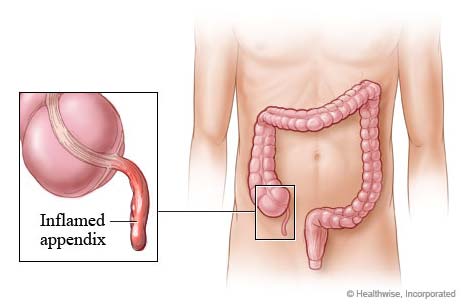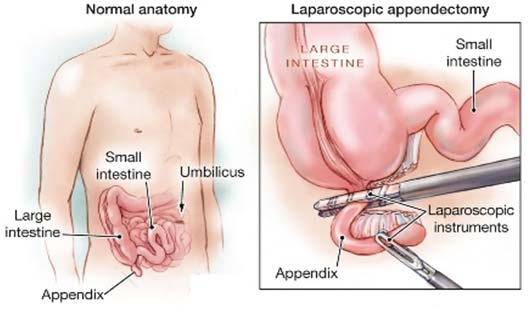Appendix surgery, or appendectomy; is a surgical procedure that involves removing the appendix, a small involuntary tube-like organ located in the lower right abdomen.
The appendix is found in the lower right abdomen and plays a minor role in immune function. However, when it becomes inflamed, a condition known as appendicitis, it can lead to severe pain and complications if not treated promptly.
If you ask us, an Appendix surgery performed under a doctor as brilliant as Dr. Atul Peters, in Delhi, is completely safe with a high success ratio.
Dr. Atul Peters is widely recognized as one of the best appendix surgeons in Delhi. With his extensive experience and expertise, he provides world-class care for patients undergoing appendectomy.
While lifestyle modifications and medications are the standard approaches for managing diabetes, some patients, particularly those with severe obesity and uncontrolled diabetes, may benefit from a more invasive treatment option like diabetes surgery, also known as metabolic surgery or bariatric surgery.
The appendix is a small, tubular organ in the lower right region of the abdomen, connected with the large intestine. Its narrow, finger-like shape allows it to extend from the cecum.
Historically, the appendix was thought to be a vestigial organ. However, recent research suggests that the appendix may have several important roles:
1. Immune Function:
The appendix is rich in lymphoid tissue, which contributes to the immune system. It is believed to help in the production of antibodies and the maturation of immune cells, playing a role in the body's defence against infections.
2. Gut Flora Reservoir:
The appendix may serve as a reservoir for beneficial gut bacteria. After gastrointestinal illnesses that lead to a loss of gut flora, the appendix can help repopulate the intestines with these beneficial microbes, aiding in digestion and maintaining gut health.
3. Role in Digestion:
Although its role in digestion is not as critical as other parts of the digestive system, the appendix may help in the breakdown of certain carbohydrates and in the absorption of nutrients..
However, the appendix is mostly associated with the medical condition of appendicitis. Highly inflammatory phenomena related to the appendix, like appendicitis and its consequences (perforation, peritonitis) require special attention.
Appendicitis is the inflammation of the appendix.

Factors causing Appendicitis:
• Obstruction: Hard, stone-like faeces, can block the appendix and obstruct the normal passage of waste. Ingested foreign bodies may also obstruct the appendix, as can benign or malignant tumors that block its opening, ultimately leading to inflammation.
• Infection: Gastrointestinal infections can trigger appendicitis, as certain viruses and bacteria may infect the appendix, causing swelling and inflammation.
• Gastrointestinal Diseases: Patients with inflammatory bowel diseases such as Crohn's or ulcerative colitis may be predisposed to appendicitis as a result of colonic inflammation.
• Genetic Susceptibility: Some individuals are genetically susceptible to appendix inflammation. This may imply that some people are predisposed to getting appendicitis.
Whenever you have the syndrome of appendicitis with pain in the abdomen along with nausea, vomiting, and sometimes fever, you must draw the doctor's attention right away because early diagnosis is the only hope toward avoiding even more serious complications.
Appendicitis is characterized by a range of symptoms that can vary from person to person. Recognizing these signs early is crucial for prompt treatment.
Symptoms:
1. Loss of appetite
2. Abdominal bloating
3. Sharp pain in the right lower quadrant of the abdomen
4. Pain worsens with the movement, coughing, or walking
5. Nausea and vomiting
6. Low-grade fever that may rise
7. Constipation or diarrhoea
These symptoms should be reported immediately to a doctor for early treatment as delayed diagnosis can lead to serious complications, such as a ruptured appendix.
The most common cause of appendicitis is blockage of the appendix’s narrow opening. This may cause bacteria to become trapped within the appendix and therefore progress to infection and inflammation.
Complications may arise if the appendicitis is not treated in time since the infected appendix may rupture. There are various appendicitis risk factors including:
• Age: Appendicitis may develop in any person at any age but is most frequent among those aged 10 to 30 years.
• Gender: Appendicitis is more prevalent in men than women.
• Family history: Some individuals may be genetically prone to appendicitis.
• Medical history: Patients suffering from certain inflammatory bowel diseases like Crohn’s or ulcerative colitis might be more prone to this condition.
Appendectomy, the surgical removal of the appendix, is the primary treatment for appendicitis. There are two main types of appendix surgery, each with its advantages and considerations.
• Open appendectomy requires an incision on the abdomen and is more invasive in nature.
• Laparoscopic appendectomy requires several small incisions, a camera, and some other special instruments. Being minimally invasive, laparoscopic appendectomy heals more rapidly, has less postoperative pain, and leaves minimal scars compared with open surgery.
Appendicectomy is performed based on the severity of appendicitis, the patient’s medical condition, the surgeon's expertise, and the facilities available.

Laparoscopic appendix surgery or laparoscopic appendectomy is a minimally invasive surgical procedure to remove the appendix. This method involves making several small incisions in the abdomen, rather than a large, open incision.
A laparoscope, a thin tube with a camera and light, is inserted through one of the incisions. The surgeon uses the laparoscope to view the inside of the abdomen on a screen and guide surgical instruments through the other incisions to remove the appendix.
A laparoscopic appendectomy is a surgery performed through some incisions with the aid of a rotoscope, as opposed to a conventional open surgery where a larger opening is made in the stomach to remove the appendix.
» Fewer and minimal cuts: Less damage on the body and faster healing time.
» Decreased postoperative discomfort: Much less pain is felt by patients.
» Quicker healing: Lesser time in the hospital and much faster resuming of normal processes.
» Less chances of post-operative infection: Smaller cuts increase protection from infection after the surgery.
» Little or no scars: There is minimal scarring which results in better cosmetic surgery results.
» Enhanced accuracy: The instrument enables a clearer picture of accuracy.
While it's common to experience some shoulder and chest discomfort for a few days after the surgery due to the use of carbon dioxide gas, laparoscopic appendectomy is generally a safe and effective procedure.
After undergoing an appendectomy, proper post-surgery care and understanding the recovery process are crucial for a smooth and effective healing journey.
Your recovery timeline after an appendectomy will depend on the type of procedure performed, whether any complications occurred during or after surgery, and your overall lifestyle.
» Avoid heavy lifting: From a biological perspective, the abdominal wall recovers its normal resistance to exertional stress completely within 30 days after a laparotomy, provided healing proceeds without complications.
» Return to work/school: That will be a decision you make at the appropriate time for your circumstances.
» Laparoscopic appendectomy: Most incision sites are treated with Steri-Strips and the bandages will come off on their own after a few days.
» Wound care instructions: The incision site must be touched only after proper hygiene. Facilities of loose clothing without elastic physical pressures must be utilized. The location should be maintained in a clean and dry condition.
» You should follow your surgeon's advice: Your surgeon will have his set of guidelines regarding post-operative care to ease pain.
» Use a pillow: One can help a splint by using a pillow over their abdomen and thus get relief from the pain.
By following these guidelines, a faster smoother recovery and a normal daily life will no longer be a distant dream.
Dr. Atul N. C. Peters is a renowned surgeon with over 25 years of experience and currently serves as the Senior Director and Head of the Department of Bariatric, Minimal Access,
and Robotic Surgery at Max Hospital in Saket. He is a DNB and Fellow in several high-profile groups of surgeons.
Prof. Peters holds the record for performing the maximum number of bariatric surgeries in one day. He has made a mark for conducting successful ‘bariatric surgeries in Delhi’.
He also co-founded the Asia-Pacific Chapter of the International Federation for the Surgery of Obesity and Metabolic Disorders (ACMOMS).
In addition to his surgical expertise, Dr. Peters is a certified fitness trainer and a passionate music lover, playing 18 different instruments. His dedication to both medicine and personal interests makes him a remarkable personality.
Appendicitis is a condition where the appendix becomes inflamed and infected.
The most common treatment for appendicitis is surgery, known as an appendectomy. This procedure involves removing the inflamed appendix. It can be performed as an open surgery or, more commonly today, as a laparoscopic surgery.
If you ignore appendicitis symptoms, the condition can worsen. The appendix may rupture, releasing its contents into the abdomen. This can lead to peritonitis, a serious infection of the abdominal lining.
Recovery time from appendix surgery varies depending on the type of surgery (open or laparoscopic) and individual factors.
During recovery, it's important to follow your doctor's instructions, rest, and avoid strenuous activities.
Laparoscopic surgery typically results in smaller, less noticeable scars compared to open surgery. You may have a few small incisions around your abdomen.
Yes, you can live a perfectly normal life without an appendix. The appendix is considered a vestigial organ, meaning it no longer serves a significant purpose in the human body.